Adopting Zero Trust
Adopting Zero Trust offers an ongoing conversation that elevates cybersecurity conversations that encourages you to rethink how you build strategies, defend against threat actors, and implement new technology. We go beyond the millions in marketing budgets fueled by VCs, and chat with practitioners like you who want to make a difference (or hack the planet, which ever happens first).
Episodes

Thursday Dec 11, 2025
Thursday Dec 11, 2025
In this episode, we break down Whisper Leak, a newly disclosed side-channel issue affecting encrypted LLM communications. JBO explains how attackers can infer conversation topics using packet size and timing metadata without breaking encryption. The discussion covers how the research team discovered the issue, how vendors (including Microsoft and OpenAI) mitigated it, and what it means for the future of secure AI systems.
01:30 – What Whisper Leak Actually Is02:30 – Understanding Side-Channel Attacks04:00 – Why LLMs Are Uniquely Vulnerable08:00 – Stream Ciphers vs Block Ciphers13:30 – “Did You Break Encryption?” Clearing Up Misconceptions16:00 – Fixes & Mitigations Across LLM Vendors18:30 – Why Some Vendors Were More Vulnerable Than Others20:00 – Could High-End Adversaries Still Pull This Off?24:00 – How API Users Can Protect Themselves25:00 – Designing LLM Systems with Side Channels in Mind
Guests: Jonathan (JBO) Bar Or, Principal Security Researcher, Microsoft Threat Intelligence, who just joined CrowdStrike
Hosts: Elliot Volkman & Neal Dennis
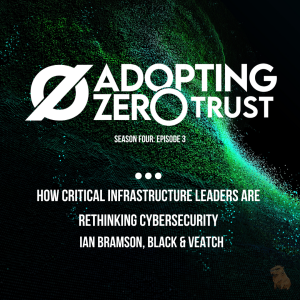
Thursday Apr 17, 2025
Thursday Apr 17, 2025
In this episode of Adopting Zero Trust, hosts Elliot Volkman and Neal Dennis discuss critical infrastructure security with expert guest Ian Branson, Vice President of Global Industrial Cybersecurity at Black and Veatch.
The discussion centers around the philosophical and strategic approaches to handling incidents and breaches, especially in the operational technology (OT) realm. Branson highlights the importance of understanding what needs protection, the integration of IT and OT security, and the crucial role of threat intelligence. They also explore the evolving need for converging physical and digital security data to manage risks effectively.
01:37 Starting Point for Protecting Critical Infrastructure
04:52 Funding and Resource Allocation for Cybersecurity
10:57 Threat Intelligence and Incident Response
16:25 IT and OT Convergence
23:47 Discussing Employee and Equipment Management
26:19 Integrating Physical and Cyber Security
34:39 Proactive Security Measures in New Constructions
40:46 Balancing Rapid Response and Availability
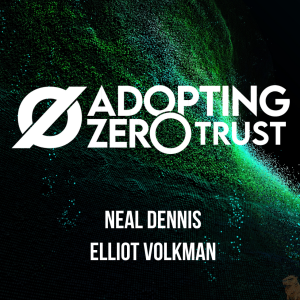
Thursday Mar 20, 2025
Thursday Mar 20, 2025
In this episode of Adoption Zero Trust (AZT), host Neal Dennis and producer Elliot Volkman sit down with Bradon Rogers, Chief Customer Officer at Island, to discuss how AI is compounding the already existing problems tied to shadow IT. The conversation explores how modern enterprises handle the growing complexities of unregulated software use, the role of enterprise browsers in mitigating risks, and the dynamic between user experience and cybersecurity.
01:16 Shadows within shadows
04:15 AI in Approved Solutions
09:14 Enterprise Browser and Security
14:25 Transition to Browser-Based Applications
16:23 Enterprise Browser Capabilities
18:45 Data Protection and Shadow IT
24:39 Shepherding Data in the Enterprise Browser
25:17 Policy Perspectives on AI and Data Flow
28:16 Exploring SBOM and AI Integration
35:39 Browser Security and Application Boundaries
41:40 BYOD and Privacy Concerns
44:48 Third-Party Scenarios and Onboarding
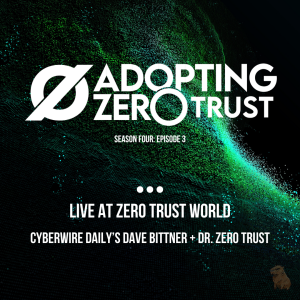
Thursday Mar 06, 2025
Thursday Mar 06, 2025
Catch this episode on YouTube, Apple, Spotify, or Amazon. You can read the show notes here.
Live from ThreatLocker’s Zero Trust World (ZTW), cybersecurity heavyweights Dave Bittner, host of CyberWire Daily and Dr. Chase Cunningham AKA Dr. Zero Trust shared their unfiltered thoughts on the state of cybersecurity, AI, and government regulations. From the shifting landscape of compliance enforcement to the role of hitting critical mass of AI in both defense and cybercrime, we can expect an extraordinary level of change in the years ahead.
01:37 Cybersecurity Landscape Overview
01:58 Government and Cybersecurity
02:39 Leadership and Appointments in Cybersecurity
03:47 Future of CISA and Compliance
06:41 Managing Cybersecurity News
14:54 The Role of LLMs in Cybersecurity
16:22 Global Perspective on AI and LLMs
18:47 Reflecting on Past Technological Predictions
20:18 The Double-Edged Sword of AI and Surveillance
24:21 The Dark Side of Technological Advancements
26:17 Debating the Term 'AI' and Its Implications
28:43 Historical Anecdotes and Unanswered Questions

Wednesday Mar 05, 2025
Wednesday Mar 05, 2025
New intelligence: Silk Typhoon, formerly tracked as HAFNIUM, is a China-based threat actor most recently observed targeting IT supply chains in the US. Today, we released a new report in conjunction with the Department of Justice's action against twelve Chinese nationals that includes mercenary hackers, law enforcement officers, and employees of a private hacking company. This group has been charged in connection with global cyberespionage campaigns. Dive into our latest blog for all the details.
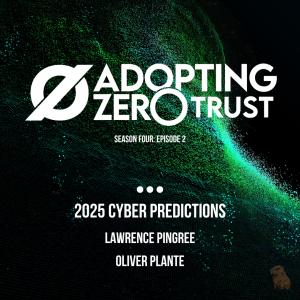
Tuesday Feb 18, 2025
Tuesday Feb 18, 2025
It’s mid-February, but somehow, we’ve already been through what feels like a year's worth of change in the cybersecurity and regulation world. Beyond the standard incidents, outages, and attacks… there have been obvious impacts that have downstream effects. Regardless of regulatory changes, which we’ll cover as those impact our space, AZT brought together a few minds who have thoughts on the year ahead.
To properly kick off season four, we have the privilege of chatting with two wonderful guests:
Lawrence Pingree, VP of Technical Marketing at Dispersive, but you are more likely to know his name from his time at Gartner. However, he has a varied background ranging from CTO to security engineer, so don’t let that marketing line in his title fool you.
Oliver Plante, VP of Support at ThreatLocker, has around 15-20 years of IT under his belt. He also has seen a thing or two when it comes to implementing new cybersecurity strategies
03:21 Predictions for the Year Ahead
04:06 Zero Trust and Least Privilege
05:40 The Future of Cyber Defense
07:21 AI and Cybersecurity
08:41 Threat Intelligence and Preemptive Defense
09:50 Challenges and Innovations in Cybersecurity
14:23 The Role of AI in Cyber Attacks
26:18 Quantum Computing: Threat or Savior?
29:31 Passwordless Security: The Future
30:57 Challenges of Deepfake Technology and Passwordless Security
33:03 Blockchain and Its Applications in Security
35:33 Debate on Password Management Practices
38:03 User Responsibility and Security Automation
47:50 Government's Role in Cybersecurity
57:14 Future of Cybersecurity and Zero Trust
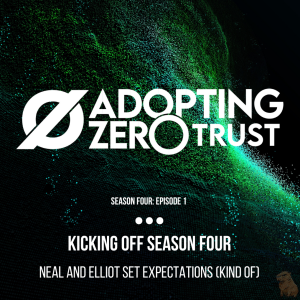
Tuesday Feb 11, 2025
Tuesday Feb 11, 2025
Catch this episode on YouTube, Apple, Spotify, or Amazon. You can read the show notes here.
Neal and I are excited to welcome you back to AZT as we kick off our fourth season. After four years of trying out different formats and episodes, including at least an entire season terrorizing vendors for slapping Zero Trust on their box as if it were something you could buy, we’re ready to narrow our focus a bit.
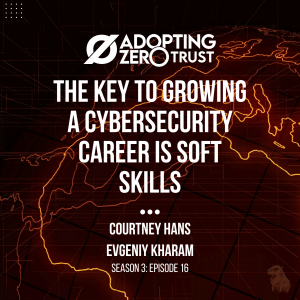
Thursday Dec 19, 2024
Thursday Dec 19, 2024
In this episode of 'Adopting Zero Trust (AZT)', host Neal Dennis and producer Elliot Volkman delve into the often-overlooked realm of soft or 'non-tech' skills in cybersecurity.
This week, we chat with Courtney Hans, VP of Cyber Services at AmTrust Financial Services, and Evgeniy Kharam, author of Architecting Success: The Art of Soft Skills, who help us explore how non-technical skills are vital in shaping the careers of cybersecurity professionals.
Our guests share the importance of effective communication, emotional intelligence, and adaptability. The hosts and guests share personal anecdotes, training tips, and the necessity of bridging technical prowess with essential soft skills to improve stakeholder engagement and career advancement. The episode emphasizes the value of being comfortable with discomfort and soliciting feedback to enhance one’s professional journey in cybersecurity.
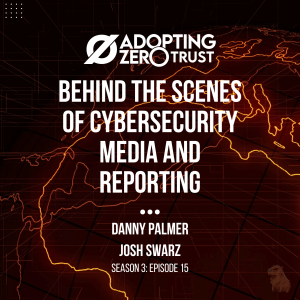
Thursday Nov 21, 2024
Thursday Nov 21, 2024
Season 3, Episode 15: We gather a panel of journalists, communications, and a researcher to discuss how cybersecurity news and incidents are reported.
You can read the show notes here.
In the world of cybersecurity journalism, you can broadly divide it into four competing forces: reporters, communications teams, researchers, and readers. Each requires the other to accomplish its goals, but they all have very different priorities and goals.
Journalists have a duty to inform the public about security-related events.
Communication teams have a duty to inform the public about related incidents and research, but in a controlled setting.
Researchers help provide answers to communication teams and journalists.
Readers want to be informed of information that impact them, and their habits shape what kind of reporting is invested in the most.
This week we explore some of these dynamics by bringing together a panel representing comms, journalism, and research to discuss the game of tug-of-war during incident response and incident reporting.
Danny Palmer was a long-standing cybersecurity reporter at ZDNet prior to recently joining DarkTrace, Josh Swarz is the Senior Communications Manager at Microsoft focusing on threat intelligence, our host Neal Dennis is former NSA and has lived many lives around either keeping secrets or uncovering them, and producer Elliot Volkman has been a reporter for two decades and works with Josh on elevating research at Microsoft Threat Intelligence.

Thursday Oct 24, 2024
Thursday Oct 24, 2024
In our final preview episode of GRC Uncensored, we explore a particularly bipolar debate: do you need a GRC tool to manage compliance, or will spreadsheets suffice?
After this, we will be back to our regularly produced AZT episodes. The last episodes of our pilot for GRC Uncensored can be found on your favorite podcast app or newsletter on Substack.







